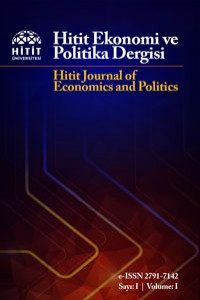ULUSLARARASI İŞLETMELERDE POLİTİK RİSKLERİN YÖNETİMİ VE POLİTİK RİSK SİGORTASI
Anahtar Kelimeler:
Uluslararası İşletme, Politik Risk, Tek Risk Sigortası, Politik Risk Sigortası
MANAGEMENT OF POLITICAL RISKS IN INTERNATIONAL BUSINESS AND POLITICAL RISK INSURANCE
Political risk is the sum of the economic losses that businesses may suffer as a result of the ineffectiveness or influence of public authorities. It is the most important risk that international businesses may face abroad. Since international businesses do not operate in only one country, they may be exposed to varying degrees of political risk through the approaches of various governments. The presence of political risks stands as the biggest obstacle to foreign investments of enterprises. One of the arguments used for the management and minimization of political risks is political risk insurance. Political risk insurance is a type of insurance that businesses take out in order to secure risks such as changes in the political order in the foreign country where trade or investment is made, political instability or crises. Companies and distributors doing contracting works abroad also prefer this insurance. In recent years, political risk insurance has emerged as the most preferred type of insurance in Turkey in order to secure the investments of contractors, trade and industrial organizations abroad in terms of political risk and to prevent damage to export and import agreements. With this insurance, war and political violence, expropriation, breach of contract, transfer restrictions etc. risks can be covered under insurance. The providers of this insurance are not only private insurance companies, but also reinsurers, export credit institutions and insurance providers in international organizations.
In this study; The management of political risks in international businesses, the general conditions of the political risk insurance, which is put into practice under the name of Single Risk Insurance against political and commercial risks, the direction of implementation and the latest developments are discussed.
___
- Betz Timm, Pond Amy. 2019. “Foreign Financing and the International Sources of Property Rights.” World Politics 71 (3): 503–41.
- Kim Yong Kyun. 2017. “States Sued: Democracy, the Rule of Law, and Investor-state Dispute Settlement (ISDS).” International Interactions 43 (2): 300–25.
- Pond Amy. 2018. “Financial Liberalization: Stable Autocracies and Constrained Democracies.” Comparative Political Studies 51 (1): 105–35.
- Ross Michael L. 2012. The Oil Curse: How Petroleum Wealth Shapes the Development of Nations. Princeton, NJ: Princeton University Press.
- Wilson Matthew Charles, Wright Joseph. 2017. “Autocratic Legislatures and Expropriation Risk.” British Journal of Political Science 47 (1): 1–17.
- World Bank. 2011. World Investment and Political Risk 2011. Washington, DC: World Bank.
- Yayın Aralığı: Yılda 2 Sayı
- Başlangıç: 2021
- Yayıncı: Hitit Üniversitesi
